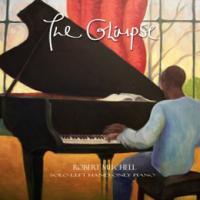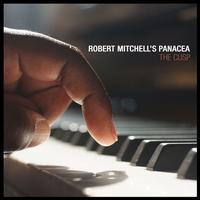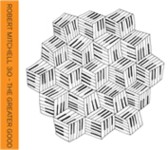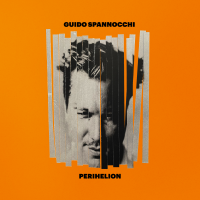Home » Jazz Musicians » Robert Mitchell
Robert Mitchell
Piano,Keyboards,Composer,Lyricist,Teacher,Arranger
Projects: Robert Mitchell's Panacea (4-6piece band Deborah Jordan Vocals, Tom Mason Bass, Richard Spaven Drums), Robert Mitchell & Omar Puente (piano+Violin duo), Robert Mitchell 3io (pno,bass,dr trio as Panacea), Robert Mitchell and Julien Siegal (piano+sax duo),Solo piano, Robert Mitchell and Corey Mwamba duo (piano+vibes),new one tba....
Robert Mitchell has been twice individually nominated for the BBC Jazz Awards (Best Newcomer,and Best New Work) , winning once as part of the F-ire Collective (Innovation 2004).He has won National and Inernational awards with the groups Quite Sane and J-Life. He has performed in many different projects - with names like Steve Coleman, Norma Winstone, Courtney Pine, Vaughn Hawthorne-Nelson ,I.G.Culture,Greg Osby,The Roots,Steve Williamson,The Jazz Warriors,Keith Waithe,Ty, Sillhouette Brown, Shorter Stories, Ntoumos and Omar Puente & Cubania .He has taken part in a feature film (The Cats Miaow dir. Peter Bogdanovich 2000). As part of a duo project with Cuban violinist Omar Puente - a tv programme was made about the pair in Cuba - featuring a performance in the Havana Jazz Fest (A Todo Jazz 2005). Their debut Cd BRIDGES (F-ire CD16) came out in 2006. Robert's band PANACEA did a BBC Radio1 Session for Gilles Peterson, and performed in the North Sea Jazz Festival (July2006 - Holland) and Vienne Festival (July 2008 France) .Their debut cd VOYAGER (Dune) was released in 2001 (earning the first BBC nomination for Robert). Their 2nd cd TRUST (F-ire CD5) was released in 2005 to fantastic reviews.Robert Mitchell's Panacea was also nominated in the Gilles Peterson Worldwide Awards (for best live session). Robert has been previously commissioned by the Jerwood Trust/BBC and Nuance (a collaboration between Panacea and RPO orchestral musicians ), as well as Nitro/ROH (a opera collab project - in development). His education work has included projects at WAC,City Uni,Middlesex Uni,and the Royal Academy Of Music (Jazz course - as solo,ensemble teacher,and examiner) . He is working with US vocalist Jhelisa Anderson- in both the electric band, and her Nina Simone Project.He also works with unique composer/reedsman Dan Stern, bassist to rock/pop legends Yolanda Charles project The Deep M.O., and US vocalist Jose James (signing to Gilles Petersons Brownswood label). He has also curated a new solo piano festival/event - called Lifting The Lid : A Celebration Of Modern Solo Piano . This took place at the Pizza Express on the 13-15Sept 2007. A solo piano album EQUINOX (F-ire) was launched during the event (F-ireCD15).
The debut 3io album The Greater Good will be released in October 2008.
Read moreTags
The Flame: Towards The Flame Vol 1

by Mike Jurkovic
Three of Europe's most acclimated and proven improvisers--pianist Robert Mitchell (Steve Coleman, Greg Osby), bassist Neil Charles, and drummer/percussionist Mark Sanders (Jah Wobble, Rachel Musson)--band together as The Flame for the first time and emerge from pandemic isolation, and the forever wars and broken civics that accompanied it, with a hypnotic performance captured absolutely live on Towrads the Flame. Recorded at London's Cafe Otto in February of 2022, The Flame comes to life like most screams do: with ...
read moreGeorgia Mancio: Live At ReVoice!

by Bruce Lindsay
The name at the top of the cover of Live At ReVoice! is that of Georgia Mancio, the London-based vocalist who appears on every one of the 12 tracks. A quick glance lower down the cover adds a dozen more names--a list of Mancio's accompanists that reads like a veritable “Who's Who" of the UK jazz scene. A baker's dozen of talented performers, twelve beautifully performed songs, captured with exceptional sound quality. Mancio has organised the ReVoice! festival ...
read moreRobert Mitchell: The Glimpse

by Bruce Lindsay
Pianist Robert Mitchell offers insight into a very particular musical place on The Glimpse: the world of solo, left hand only piano. The left hand: the hand responsible for the rhythm, the hand that keeps the beat, that lies in thrall to the melodic, excitable and exciting right hand. Why on earth would anyone want to play the piano using only the left hand? What a waste of half a keyboard and, indeed, half a pianist. Mitchell--a left hander himself--needs ...
read moreRobert Mitchell's Panacea: The Cusp

by Alex J Watson
Robert Mitchell's Panacea presents The Cusp, its third album, and debut release for Edition Records. This collection of ten highly arranged original compositions by Mitchell, combines complex rhythmic writing with contemporary vocal jazz. The recording is delivered with a squeaky-clean production sound that can only be a reflection of the leader's attention to detail, and a personal involvement at every level. Mitchell was certainly wearing his heart on his sleeve when writing this record--from his ensemble writing ...
read moreRobert Mitchell 3io: The Greater Good

by Bruce Lindsay
The Greater Good was declared the “Best Jazz Album of 2009" by influential British DJ Gilles Peterson. At a time when piano trios seem to be enjoying a resurgence such an accolade might be hard to live up to in the face of some stiff competition, but this album's combination of original tunes, inspired covers, and fine musicianship makes it a worthy award winner. Although pianist Robert Mitchell has been around the British jazz scene for some ...
read moreRobert Mitchell & Omar Puente at St. Cyprian's, London

by Frederick Bernas
Robert Mitchell & Omar Puente St. Cyprian's Church London, England April 1, 2008
This unlikely duo of acoustic piano and electric violin allows Robert Mitchell and Omar Puente to stretch their considerable abilities beyond the confines of a conventional jazz group. Perhaps more unconventional was the venue, literally a Church of Jazz, tucked away near Baker Street in central London.
This was the perfect acoustic for such a performance. Mitchell and Puente played a ...
read moreRobert Mitchell: Equinox

by Frederick Bernas
Robert Mitchell Equinox F-IRE 2007
British pianist Robert Mitchell, yet another distinguished alumnus of bassist Gary Crosby's Tomorrow's Warriors development programme for young British jazz musicians, throws up many questions on his ambitious solo release Equinox. Performing alone is not unusual to Mitchell: as recently as 2004 he played opening recitals for saxophone luminaries Wayne Shorter and Branford Marsalis.
The launch gig for the new album took place on September 15, 2007. It was ...
read morePhosphorescence Launch @ Karamel Club, Wood Green, Sat 30th June: Robert Mitchell's Panacea & Guests

Source:
Ly-chi
Phosphorescence represents Robert Mitchell's Panacea & Guests. Robert Mitchell's Panacea Saturday 30th June. 8.00pm - 2.00am 10 7 (conc) Robert Mitchell is an award winning pianist, keyboard player, composer and lyricist who has been twice individually nominated for the BBC Jazz Awards (Best Newcomer & Best New Work), winning once as part of the F-ire Collective (Innovation 2004). He has won national and international awards with the groups Wuite Sane and J-Life and has performed with the likes ...
read more
2001-2003
JAZZ CD OF THE WEEK **** " A young UK virtuoso of McCoy Tyner - like precision, excitement, boldness, and scope . Formidable improvising skills , remarkable breadth and absorbing unpredictability . " The Guardian
"Tremendous stylistic contrast and narrative richness, an expression of the dynamic solo chops and writing abilities of the man whom his J-Life colleagues refer to as ' The Dark Scientist ' . " The Voice
"The compositions are complex and challenging . Clever construction reaps huge rewards .... astounding virtusos work from Mitchell . " The Times
























